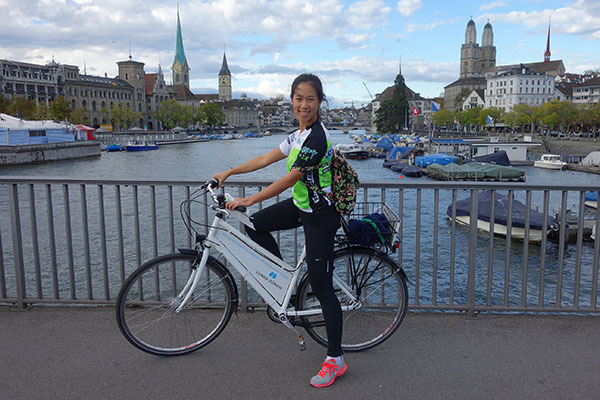
We're so proud of our fall break grant recipients, we just can't wait to feature another! Jingting "Lily" Kang is a Junior majoring in Information Technology Management and minoring in Actuarial Science. She wrote such a focused and thorough grant proposal, we couldn't help but award her a grant to travel to Switzerland over fall break. Her purpose: to conduct a pilot study addressing how to encourage and develop entrepeneurship and innovation, and how to integrate insights from Swiss entrpreneurs into the educational experience of Notre Dame students. Upon her return, Lily sent us an account of her experience.
“I didn’t learn 90% of what I am doing now from my classes in college,” said Sunnie Tolle, a 28-year-old successful Swiss entrepreneur. As the conversation went on, I learned about some of the key experiences in her life that contributed to her skill set, passion, and character. These experiences include participating in the apprenticeship system when she was a teenager, starting a club dedicated to creative projects during college, and going to social and networking events where she connected with many entrepreneurs who would influence her life.
The research question for my pilot study was: Besides institutionalized education, what experiences are necessary for someone to have an entrepreneurial mindset, acquire innovative capabilities, and carry out successful ventures? Comparing over 20 narratives from entrepreneurs in Switzerland this past fall break, I have found that Sunnie’s learning experience, or lack thereof, is not unique. In fact, many entrepreneurs in Switzerland share similar paths in becoming entrepreneurial and acquiring innovative skills. Drawing similarities from their narratives on their learning experiences, the research has produced these three findings: 1) Students’ fear for failure can be best reduced through exposure to hands-on practice at an early age; 2) an effective way to nourish college students’ interests in entrepreneurship is through face-to-face engagement with seasoned entrepreneurs; 3) extracurricular activities that develop students’ team working, critical thinking, and leadership skills are key to entrepreneurs’ future success.
My research contributes to the ongoing conversation about how we can re-imagine education strategies and develop a more effective approach to cultivate the next generation of entrepreneurs in the U.S as well as specifically at Notre Dame. My seven-day field research in Switzerland allowed me to build strong connections with people and organizations in the entrepreneurship world. I am planning on carry out a full-scale research project on a more focused and narrowed topic this winter break, hoping to formulate my senior thesis as a result of the experience.
My main research methods were interviews and participant observation. Not only did I grow intellectually as a result of my field research, but I have also gained tremendous personal growth from this research experience. Conducting interviews with total strangers in a foreign country that I had never been to was not a simple task. It took both courage and caution to reach my goals effectively. For one thing, one has to be confident and courageous when going about interviewing people and delving deep into the research questions over a conversation. For another thing, it is important to stay cautious about cultural norms and be aware and sensitive of people who have different cultural backgrounds. The balance between the two can be sometimes hard. However, the exposure to a different society, culture, and environment through the people of Switzerland has allowed me to gain cross-cultural competence, confidence, and interpersonal skills. These are extremely valuable qualities to have for someone like me who is going to pursue a career in entrepreneurship. Coming back from Switzerland, I feel that I am more capable of connecting effectively with others. My enhanced interpersonal skills have been one of the lasting and valuable effect my research in Switzerland has had on me.
In addition to intellectual growth and academic development, my research in Switzerland has led to new perspective and insights that have been key to the growth of my leadership skills. Learning from established entrepreneurs and attending networking events with entrepreneurs have allowed me to transform my learning into action. For example, I adapted the feedback model from the entrepreneurship student club in Switzerland for my own club related to entrepreneurship.
I am deeply grateful for the guidance and financial support provided by the Nanovic Institute. My research experience in Switzerland was a milestone witnessing the remarkable growth of my intellectual interests on the research topic as well as my growth as a person. Here, I would like to express my sincere thanks to those who have made this opportunity possible.